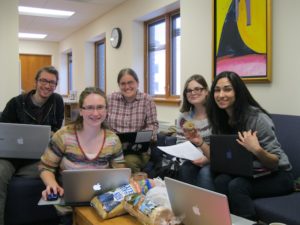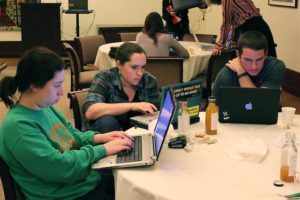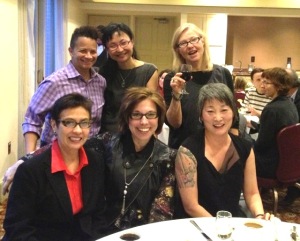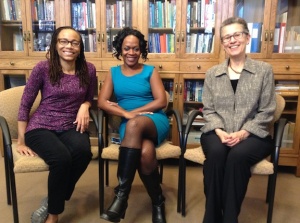feminist wiki-storming
Why Teach with Wikipedia?
There are a number of ways that having students work on Wikipedia pages as part of a class can support educational goals. It offers a chance for research and writing to be experienced as a collaborative enterprise as well as an individual activity. It deepens students’ understanding of social media, and it helps them to become more critical thinkers as they engage with the Wikipedia community and its evolving values. It offers them a chance to be an active part of knowledge dissemination and the ongoing public conversation over what constitutes knowledge. Perhaps most crucially, it allows students to take the research and writing process all the way to the publication stage, something that is not normally possible within a single quarter or semester. The awareness that their pages will be visible to a worldwide audience—and that their entries are likely to be critiqued in various ways by the Wikipedia community of editors— tends to raise the bar for student achievement. To date, Wikipedia editing has been successfully integrated into a wide range of fields, from English to Science & Technology Studies to Art.
What can Teaching with Wikipedia Offer Classes about Feminism?
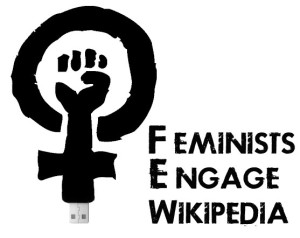 Faculty teaching courses about feminism, or that touch on feminist issues, find that having students engage with Wikipedia can develop their critical awareness in several ways. Fruitful discussions of gender bias (as well as other forms of bias) can develop from close analysis of Wikipedia entries, subject areas, and taxonomies, as well as patterns of language use and social interaction on the site. Students who take the responsibility to create or edit Wikipedia pages where shortcomings have been identified make the crucial step from observer to shaper of the public discourse.
Faculty teaching courses about feminism, or that touch on feminist issues, find that having students engage with Wikipedia can develop their critical awareness in several ways. Fruitful discussions of gender bias (as well as other forms of bias) can develop from close analysis of Wikipedia entries, subject areas, and taxonomies, as well as patterns of language use and social interaction on the site. Students who take the responsibility to create or edit Wikipedia pages where shortcomings have been identified make the crucial step from observer to shaper of the public discourse.
What Kinds of Wikipedia Assignments are There?
One common approach is to have students add missing items to Wikipedia, such as biographies of notable women or topical entries related to gender or feminism in some way. While we see the need for traditional Wikipedia assignments that focus on adding such content to Wikipedia, we also want to encourage professors to develop assignments that encourage students to learn about the processes on Wikipedia that are responsible for perpetuating some of the gender bias inherent in traditional encyclopedias and culture at large. Please see below for approaches to creating assignments and links to existing assignment examples.
Wikistorming Learning Objectives
In summary, among the possible learning objectives for Wikistorming assignments and projects are the following:
- Students learn to write for diverse, global audiences
- Students learn information literacy for the digital age
- Students develop the research and writing skills to contribute to the world’s largest encyclopedia
- Students contribute to the effort to create a more equitable, inviting knowledge-space
- Students learn about how knowledge is produced and consumed, becoming better critical thinkers
- Students become an integral part of a knowledge-building community
- Students learn about engaging in principled intellectual discussion in the public sphere
- Students gain skills in collaborative writing
Approaches to Teaching with Wikipedia
There are a plethora of ways that one might teach with Wikipedia. Below are a couple of starting points, which are by no means exhaustive. We have offered more details on kinds of assignments that the Wikistorming Committee has discussed or that have been taught by other FemTechNet members in the Sample Wikipedia Assignments page.
- Developing critical readings and understanding the topics/issues/people for which Wikipedia articles exist While Wikipedia is much larger than any previous encyclopedia because it is not limited by the printed page, not every topic has an article and many are excluded. Wikipedia has a “notability” threshold that topics must reach to be included. Understanding the complex criteria that make up this policy and the debates that surround it is a key part of understanding Wikipedia.
- Identifying areas for new article creation or article expansion Once students have a sense of the notability threshold, they can identify areas in which to propose new articles or expand existing content. This process might also include discussions of what doesn’t rise to the level of notable and a critical appraisal of how that impacts content and what kinds of dependencies within the resource are thereby suggested.
- Survey existing debates to understand how the editorial community works The editorial community of Wikipedia consists of many different kinds of editors and there are robust conversations regarding the structure, processes, and content of Wikipedia. Introduce students to the concept of the “Talk Page” and then encourage them to learn from discussions and participate.
- Participate in the content creation One of the best ways to understand how Wikipedia works is to participate in content creation. This can range from small scale editing to the creation of articles or projects. See the sample assignments for ideas on how to get started.
- Participate in the peer review process Wikipedia depends not only on the work of editors for content creation, but also for peer review of existing articles and support of other editors. Students can join in this critical review process.
Creating Assignments
There are a number of ways to approach developing assignments and events for Wikistorming efforts. Whatever you choose, we recommend that you consult someone who has done such an assignment or event before and/or poke around on Wikipedia yourself so that you have a good sense of the possible areas of confusion and pitfalls. The Wikipedia Education Program has Campus Ambassadors and Online Ambassadors that can help you with your classes and Wikipedia:GLAM can help you if you are working on events with cultural institutions. Please also see more information on Types of Wikipedia Work from FemTechNet.
Example of Five Wikistorming Projects
For the Fall of 2013, DOCC professors and students worked on the following five projects:
- Adding feminist scholarship to already existing content on Wikipedia
- Creating and expanding articles on women who played and are playing important roles in history and current events
- Making Wikipedia readers and editors more aware of the systemic gender bias inherent in the encyclopedia’s structure
- Encouraging feminists, academics, and activists to contribute to Wikipedia and help revolutionize its culture
- Participating in Wikipedia’s processes
By adding articles and information about women and feminist scholarship, we are making certain women and their contributions to culture are remembered and acknowledged in the digital landscape. By becoming contributors to Wikipedia, we are helping change the demographics of Wikipedia’s editor-base in order to create a more equitable, inviting space. These projects emphasize the collaborative nature of both Wikipedia and feminist projects – they do not have to be ones in which a professor dictates all of the rules and then gives a grade. We want to encourage professors and students to learn together, contribute together, and become part of the larger Wikipedia community. As such, we have created a hub of activity at WikiProject Feminism on Wikipedia, an open tasks list, that lists article related to these goals very broadly. If you are looking for areas to contribute, this is a good place to start.
Sample assignments developed by instructors who are already working with Wikipedia in their classes are linked below.
Resources
From Members of FemTechNet:
Essential Wikipedia Resources:
From the FemTechNet Vimeo Channel:
